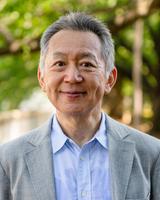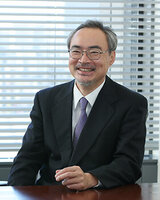Event Report Energy and the Environment
CIGS Energy and Environment Seminar (Diana Ürge-Vorsatz) "The need for disruptive innovation in relation to climate change mitigation"
November 30, 2017,
16:00
- 17:30
Venue: CIGS Meeting Room3
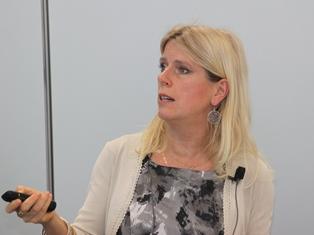
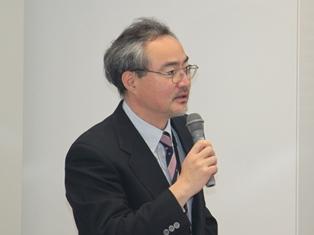
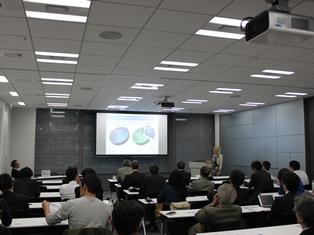
(Ms. Ürge-Vorsatz, Mr. Sugiyama from the left)
Seminar outline
Title: "The need for disruptive innovation in relation to climate change mitigation"
Speaker: Diana Ürge-Vorsatz, Vice Chair, Working Group III. Intergovernmental Panel on Climate Change and Director, Center for Climate Change and Sustainable Energy Policy, Central European University
Moderator: Taishi Sugiyama, Senior Research Fellow, CIGS
Presentation
Presentation by Diana Ürge-VorsatzPDF:9.28MB
Abstract of the Speech
The Fifth Assessment Report of the IPCC has paved the way for the most significant global pact on solving climate change: the Paris Agreement. However, the ambitious goals set out in the agreement place major challenges on science and technology development to pave the way for their feasible implementation. Policy-making in cases has run somewhat ahead of science in ambitious decisions and commitments. However, this is not unprecedented: such decisions to "pull" technological development and innovation have taken place in the past, even if at smaller scales.
Nevertheless, the challenge today is significant. The assessment of the scenarios out there in the scientific literature, as assessed by the IPCC's Fifth Assessment Report, have shown that meeting ambitious climate targets (at that time 2C was the most ambitious such target assessed) was still possible, however it entailed very significant changes in our technological-economic systems. Since then a few more years have passed without a major U-turn in global energy policies, and 146 countries have ratified the Paris Agreement committing them to make strong efforts to keep temperature rise well below 2 degrees, if possible, at 1.5 degrees. This places even more significant challenges on our socio-techno-economic systems to change course of development and step on a path that is drastically different from previous business-as-usual.
The talk will highlight how there has never been such a high pressure on disruptive innovation as in the next few years. Although the pathways to a 2C cap on warming are doable, they heavily rely on technologies that have either been politically controversial in some countries, or are in conflict with other global treaties such as the Biodiversity Convention; or whose necessary deployment levels raise scientific and political questions.
Therefore, disruptive innovations that could potentially replace some of the need for these more controversial technologies, that are also more compatible with development goals and remain at reasonable cost to societies, could be crucial to a more realistic attainment of the goals of the Paris Agreement. The talk will pinpoint several areas where recent policy commitments relevant to climate change mitigation have been placing major pressure on innovation by "running ahead of the underlying science". Two examples will also be highlighted for recent systemic innovations that could (or could not) potentially reduce emissions by significant amounts without compromises in service levels, and at large improvements of other societal development goals. Advances in innovations that achieve multiple societal goals are pivotal especially in countries where climate itself is not a strong enough policy goal to drive significant changes but synergies among several political agendas can pull climate agendas with them.
Speaker's profile
Diana Ürge-Vorsatz is a Professor at the Department of Environmental Sciences and Policy, and Director of the Center for Climate Change and Sustainable Energy Policy (3CSEP) at the Central European University (CEU). She was elected as Vice Chair of Working Group III (Mitigation) of the Intergovernmental Panel on Climate Change (IPCC) in 2015. She holds a Ph.D. from the University of California (Los Angeles and Berkeley). She served as the Acting Head of Department at CEU in 2002-2003 and directed the PhD program in 2003 - 2004.
Diana Ürge-Vorsatz was a Coordinating Lead Author in both the Fourth and Fifth Assessment Reports (AR4 and AR5) of the IPCC, contributed to the Synthesis Report of AR5, and was a lead author in its Special Report on Renewable Energy (SRREN). She served on the United Nation's Scientific Expert Group on Climate Change, and led the buildings-related work in the Global Energy Assessment. Beyond having published widely in scholarly journals and book sections in relation to energy efficiency and sustainable energy policy, she is serving as the associate editor of the Springer journal "Energy Efficiency", and is a member of the Editorial Board of "Annual Reviews of Environment and Resources". She has worked on and directed many international research projects for organisations including the European Commission, the European Parliament, the Global Environment Facility, United Nation's Environment Programme, the World Energy Council, Climate Strategies, the World Bank. She was a Visiting Professor at the International Christian University of Tokyo and a Research Scholar at IIASA (International Institute for Applied Systems Analysis). She has been serving on the Governing and Advisory boards of several organizations, including Innogy (formerly RWE), the Austrian Climate and Energy Fund (KLIEN), the European Climate Foundation (ECF), the UK Energy Research Centre (UKERC), and the Hungarian Energy-Efficiency Cofinancing Program (HEECP), and the Club of Budapest. She is the Chair of the Scientific Advisory Board of the Clean Air Action Group and the Jury of the Energy Globe Award. She is co-chair of the Scientific Steering Committee of the upcoming major scientific conference on Cities and Climate Change to be held in Edmonton, March 2018. She is regularly invited to high-level review panels, such as that evaluating the Environmental Energy Technology Division of the Lawrence Berkeley National Laboratory; the research of the EU's Joint Research Centre during FP7, and the European Research Council. She appears regularly in the media related to energy and climate change issues. She received the Hungarian Republic's Presidential Award "Medium Cross" in 2008, as well as the "Role Model" award in 2009 and was invited as a member of Academia Europaea in 2017.
